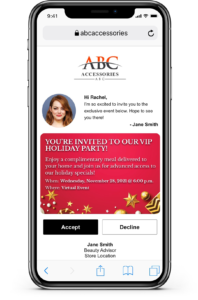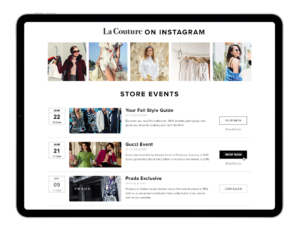Pre-pandemic, retailer-hosted events were an effective way to bring consumers together to show off the latest products, with product experts providing tips and suggestions on different models or what the next trend was. It was a way for a brand to immerse people in their “brand story” and build a loyal following. And it also introduced new consumers to the brand with a lower customer acquisition cost (CAC) than trying to acquire that customer online. Plus, the impulse buys from people in-store was a big benefit to the brand. Then COVID-19 hit, and these events came to a screeching halt.
However, savvy brands aren’t letting the pandemic get in the way of these gatherings. They’ve adapted. And the virtual event was born…
Virtual events can be engaging by nature, allowing associates to present while participants interact with them or with each other though video or chat. Livestream events are useful for associates to present product showcases, host workshops or just share their knowledge, and can be used as sales collateral once recorded.
Benefits of virtual events
Bigger turnouts: While a store has capacity restrictions and store events could only hold a limited number of people, virtual events can have literally hundreds of people “attend,” thereby increasing brand awareness to a greater number of people. Also, the RSVP rate tends to be higher at these virtual events – there is no travel involved, no need to cancel because of inclement weather, no geographical boundaries, and with so many people bound to their homes, a virtual event is seen as a “getaway” where they get the full experiential experience.
Build Loyalty by Engaging Customers in a Personalized Way: The stores or associates hosting the virtual event have the opportunity to broaden their network, nurture the attendees, and follow-up after the event in a personalized way. The conversation doesn’t have to end once the event is over – the associate can continue to nurture that one-to-one relationship, elaborate on topics that the customer was interested in during the event, and encourage two-way communication that builds loyalty.

Empower associates to create and manage their own virtual events: Store associates that are provided with mobile store technology have the ability to plan and manage their own virtual events. Associates who already have relationships with their customers invite them personally to the event and tailor the content according to the audience. They can send product links and messages to the customers they are inviting through digital channels like e-mail, text messaging and video or live chat (they can even add them in the invite itself). Customers respond directly to the associate, providing a personalized customer experience before, during and after the event. Associates using mobile store technology leverage the store and virtual events to drive online sales, and credited for sales attributed to their events.

More data is collected: The more data a brand can collect and use to personalize experiences, the greater the customer journey. Virtual events can provide brands with a deeper level of insight than they would otherwise have gotten in an in-store event. At what point during the event was engagement highest? Did people join late, signaling that the event started too early for some people? When did attendees begin to logoff? Leveraging this type of data helps ensure that each virtual event gets better and more relevant, and provides insight on individual customers’ interests.
If you’re a brand that’s looking to try a virtual event for the first time, or if you’ve done them before but feel like there’s room for improvement, we’re here to assist. With Salesfloor’s Event Management module, associates can create and manage their own virtual events and invite groups of customers via e-mail or text message. The event can also be promoted on the associate’s Storefront. Associates create an event information page and manage RSVPs directly on the Salesfloor app.

We know that the pandemic will end at some point, but virtual events are here to stay. While we’re all looking forward to the day when we can again host or attend in-store events, many brands have experimented with virtual events and the benefits are clear to them. Therefore, they should continue to be a part of a retailer’s strategy.
